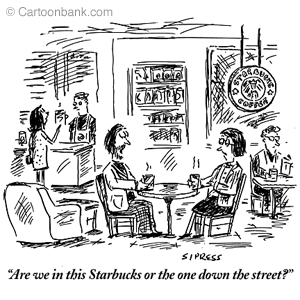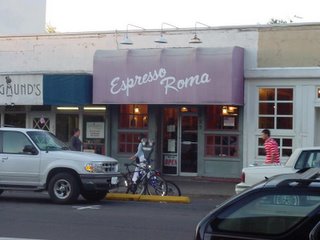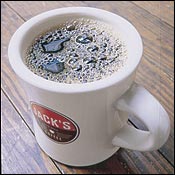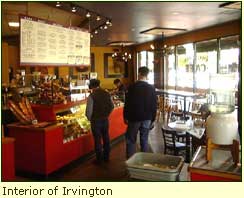
Note to the illustration: “Are we in this Starbucks or the one down the street?” (Man to woman.) [ID: 51337, Published in The New Yorker April 22, 2002]
link to the illustration
Note from the blog editor: It’s the early evening of the Christmas’ eve 2005. As browsing through stories whether about Christmas or not, I decided to go back to some of the saved stories from past. I have been debating what Christmas seems like for me and for this blog, and this coffee piece from Guardian.com I saw few weeks ago came up. I think the whole idea of Northwest America still grows in me. That is what I was looking for when I need some comforting about this western holiday fighting for whatever I am. I also would like to list some coffee shops I have my heart to them. Ooops, I am going on more coffee shops in Portland, and I realized that I can keep going on and on, but I have to stop. Enjoy the dinner table dramas!

Espresso Roma Cafe - Eugene
825 13th Avenue East
Eugene, OR 97401 [US]
http://www.espressoroma.com/store_directory.php
caption site / caption link

Stumptown Coffee Roasters
128 SW 3rd Ave
Portland, OR 97204 [US]
http://www.stumptowncoffee.com/cafes/downtown.html

Jack's Stir Brew Coffee
138 W. 10th St. (West Village), New York City [US]
between Waverly Pl. and Greenwich Ave.
http://www.jacksstirbrew.com/
caption link

Grand Central Bakery - Irvington Location
1444 NE Weidler Street
Portland, OR. 97232 [US]
http://www.grandcentralbakery.com/store_irvington.html
We used to be a nation of tea drinkers.(blog editor note: The article is from the Observer from the UK.) Now, with a coffee house on every corner, caffeine is our daily drug of choice. But is the bean habit bad for us? Simon Garfield goes on a 20-shot binge to experience the highs and lows of the new ristretto republic
by Simon Garfield
Sunday October 30, 2005
Observer
I began writing this article after five cups of good coffee, and it turned out to be one of the best articles I had ever written. It had fluency and style, and a narrative drive that gripped the reader from the very beginning and wouldn't let go until every fact had been digested and every bon mot admired.
Unfortunately, when I read it again after another four cups, I couldn't be bothered to go on with it, and in fact I could hardly concentrate on anything. I was just irritable, and I began to dislike the people I was sitting with in my local Starbucks, all those au pairs with their whiny kids and people writing their novels on laptops. It was 3pm. I wanted to trip up those rampaging children, I wanted to go to the toilet, but above all I wanted to sleep. I could have slept for a while despite the caffeine, but I would have woken up a few hours later in a sweat, so I stuck it out for the day, looking for someone to snap at. Coffee does that to people: the sudden high, the brief period of delusory creativity, the plunging low, the tiredness and anxiety and headaches. And then it does it all again the next day.
The reason I had drunk nine cups - some of them double-shot varieties, which nudged the total to as much as 1,500mg of caffeine, three times my daily intake and about one-seventh of the fatal dose - was in the interests of health journalism. I had begun to feel bad about the amount of coffee I was drinking, and wondered whether I should cut down. I looked at the dregs at the bottom of my large cup and thought, 'That can't be good.' My teenage children had also begun to have the occasional cup at home, so I began to worry about them.
But then I read some newspaper stories and I started to wonder if we all shouldn't be drinking much more. Coffee had gone from being vaguely bad for one's health to vaguely good: it could reduce cancer risks and other fatal diseases; it provided more antioxidants than fruit and vegetables. Each month the medical and nutritional journals contained a new bit of research about the effects of caffeine on rats, and most of it seemed to be good news, and not all of it was funded by the coffee industry. But the older journals told a different story, often something scarier, about negative effects on the heart. And that was just caffeine; coffee contains about 2,000 other compounds that may either shorten or prolong our lives. After thousands of years, no one seemed quite sure what the coffee bean did to us, apart from drive us in increasingly large numbers into coffee shops and improve our ability to make the perfect ristretto at home. Shouldn't we by now have a clearer message about what it was doing to us over a lifetime?
In the short term, the effects of coffee are simple to measure: one merely has to binge. I begin at the Monmouth Coffee Company in Covent Garden, where the founder and owner, Anita Le Roy, makes me a recently sourced rich Ethiopian single-estate using the drip-filter method. It smells and tastes delicious. We sit in one of the wooden booths, next to a German couple drinking latte. Le Roy began in the coffee business in the late Seventies, and her company is now regarded as one of the most adventurous and ethical coffee importers in the UK. Le Roy sells about 11,000 drinks each week from her stores in London's Covent Garden and Borough Market, but this is only a fraction of her turnover, most of which is sold as roasted beans. Each week she roasts about 1,600 kilos. She drinks only one strong cup each day herself, two if she's on holiday; more makes her speedy and blurs her thoughts. 'We do get people in who say they haven't been well, and wonder whether coffee is OK for them, and I tell them that a lot depends on where it's from and how it's treated. The qualities of instant coffee are the worst beans you can find.' She advises her staff against drinking too much when working, and they wear masks when handling shipments of raw green beans, but she has seldom encountered a customer who has dangerously overdone it. 'Occasionally someone will ask for a six-shot latte, and we tend to joke with them, asking if they are sure, rather than refusing it.'
We chat for a while about coffee dependence. 'Addiction' was widely considered to be an inaccurate term in relation to caffeine; the withdrawal symptoms were mild; most people can give up caffeine in a period of a fortnight with no lasting ill-effects and only resistible cravings; it was very hard to overdose on coffee to a fatal degree, as nausea, irritability and frequent toilet breaks take hold long before risky levels are reached; and even allnight exam students seemed to know their limit. However, Le Roy has witnessed the effect of withdrawal on one of her colleagues. Despite the vast amounts of coffee produced in Ethiopia and many other areas of Africa, one of her British shippers finds it hard to get a proper cup of coffee on her travels. 'It's not in their culture,' Le Roy says, 'so after a couple of days she gets bad headaches.'
A few feet away from Le Roy's Covent Garden store is a branch of Caffe Nero, where I began to sift through some of the medical research. Caffe Nero, with its panini tostati and light-brown decor suggesting the sun rising over Nicaraguan plantations, recently announced a doubling in its annual pre-tax profits. It has about 230 coffee sites in the UK, with at least 40 more on the horizon. This compares with 425 Starbucks at the end of last year and 370 Costa Coffee shops. The UK coffee chain market is now worth about £450m, more than double its value in 1999.
I sit on a high chair at a high table, and consider how McDonald's' wild expansionary mode slowed when the nutritionists began asking health questions. The data on coffee was more complex. Two years ago, a team of researchers at the Chemical Health Hazard Assessment Division of Health Canada in Ontario conducted an extensive review of recent medical studies into the health effects of coffee, including general toxicity, effects on the heart, impact on young people and the pregnant, on bone strength, and general behavioural consequences in adults. Their 30-page report cited more than 200 papers, many with diverse titles, such as 'Caffeine and the Calcium Economy Revisited'; 'Childhood Caffeine Tic Syndrome'; and 'Cross-Adaptation and the Influence of Caffeine on the Adaptive Response of Bone-Marrow Cells of Mouse'.
The team's conclusion? A big fat shroud of continued uncertainty. Many of the medical papers seemed to talk over each other like drunks at a party. There were a few aspects on which they agreed: coffee raised blood-sugar levels and could be a diuretic, with heavy consumption increasing the risk of dehydration. They found that those who drank a lot became tolerant to its effects. They stated that decaffeinated coffee would eradicate many of the effects of caffeine, but only if the decaffeinating process didn't add more chemicals than it took away. The experts said that while coffee did make you more alert, it would not really sober you up, much less get rid of the effects of alcohol. They said that the half-life of caffeine (the extent of its activity) was four to six hours. And they all agreed generally on how caffeine affected the brain. Caffeine dampens the neurotransmitter adenosine, which acts as a calming and mildly pain-relieving force upon the body. When adenosine is muffled, brain activity may be temporarily boosted, thus increasing what we perceive as alertness and arousal. But with an excessive presence of caffeine (which enters the brain almost immediately) the blocking of adenosine function frequently results in anxiety and hypersensitivity to pain.
The 'review of reviews' concluded that women wishing to become pregnant, and those who already were, should limit their intake to below 300mg per day (two or three strong cups), and that even small quantities induced anxiety in primary-school children (evident from the caffeine present in chocolate and soft drinks).
Much of the literature under consideration was written at a time when coffee was assumed to be a bad thing. This trend can be said to date back to the 17th century, when London women claimed it made men impotent; but in our lifetime the negative image became starker in the Seventies, when several reports suggested a link between high coffee consumption and high cholesterol levels (and this at a time when high cholesterol was the defining marker for heart disease, a view that has now been adjusted). But this link was only visible in cases where the coffee was boiled - the traditional Scandinavian way - and was barely detectable in people whose coffee was made by filtering or different methods. A link was also detected between coffee and bladder cancer, but when similar studies were conducted among those who drank coffee but didn't smoke, the link disappeared.
By my third or fourth cup at Caffe Nero, I remember the interview I had conducted earlier this year with Sir Richard Doll, the epidemiologist who had first demonstrated the link between smoking and lung cancer, and who died in July. I had remarked on the little kettle and coffee jars in the corner of his small office, and I told him that almost all the doctors I had come across drank a lot of coffee. I asked him whether there were any health risks. He said, at the age of 92, 'It's never worried me. The studies are unclear.'
Then I move into Soho for more coffee. By the time I settle at Bar Italia I have reached a state of buzzy nirvana, the caffeine turning me into a great admirer of boxer Rocky Marciano (big poster by the Gaggia machine) and footballer Alessandro Del Piero (framed shirt at the end of the bar) although I had never been half-keen on either of them before. After picking up an Italian sports newspaper with the crazy hope of being able to understand it, I think I should eat. I end lunch at Pizza Express with the Caffe Reale, which consists of baby figs in cinnamon syrup accompanied by mascarpone and a coffee of your choice. I choose a cappuccino, and begin to feel slightly unwell.
The counter-effects set in quite quickly - mild paranoia, slight heart palpitations - and it is all I can do to make my way back to my local Starbucks on the bus. I am restless, but I also crave mental excitement, anything to keep the high going.
The following day, after a troubled night, I selfadminister a sudden withdrawal. This is illadvised; after drinking coffee almost every day for at least 10 years, a steady reduction - say from two cups to one for the first fortnight - would have been better than cold turkey, especially after such a splurge the day before. I had hoped that the splurge might actually keep me going for a day or two after the event, in the same way that people are pulled over for drunk driving the morning after a drinking session. But I was wrong. My head feels as though someone has replaced much of my brain with felt, certainly enough to make concentration difficult. I am also lethargic, and as the morning wears on and my adenosine receptors find it difficult to understand where its caffeine has got to, I also develop a numbing headache.
After painkillers - the sort that, unlike many types, did not contain caffeine - I begin to consider the literature on the long-term health benefits of coffee. As the coffee industry grew, scientific good news was seized upon joyfully by the public relations departments of coffee growers' associations in the developed world, no matter how fuzzy the research. One such PR company, working for the British Coffee Association, sent me an email full of positive attachments from recent research. Much of it really did brighten my day. There was the study published earlier this year in Japan's Journal of the National Cancer Institute that suggested a possible connection between coffee drinking and a lower risk of liver cancer. The research was conducted among 334 Japanese men and women, and when all other easily identifiable lifestyle factors (including hepatitis) had been evened out, it was found that those who drank three to four cups per day were about half as likely to develop liver cancer as those who didn't drink coffee at all. The researchers reported that their work repeated the findings of animal studies (and correlated with the beneficial effects of coffee on other liver diseases such as cirrhosis), but they acknowledged that their cohort was small, and wished to see their results repeated in larger studies and in other populations.
Meanwhile, a report in the British Journal of Nutrition earlier this year concluded that because of the recent results of coffee research there was now enough evidence to classify coffee as a 'functional food': that is, a food that is seen to enhance the quality of life. The beneficial effects of caffeine had been noted in small-scale trials of those with Parkinson's disease and Alzheimer's, and two larger studies have also produced good news. Last year, research published by the Harvard School of Public Health and the Brigham and Women's Hospital in Boston found that habitual coffee drinkers substantially reduced their chances of developing type-2 diabetes, the type diagnosed most often after the age of 40 and frequently associated with obesity. The work involved an eight-year observation of more than 40,000 men and 85,000 women, and during this period 1,333 new cases of type-2 diabetes were diagnosed in men and 4,085 in women. But it was found that those who drank more than six 8oz cups of caffeinated coffee a day reduced their risk of contracting the disease by 50 per cent (men) and 30 per cent (women).
The second study, which in August prompted breathless but misleading headlines suggesting drinking coffee was better for you than eating fruit and vegetables, was delivered to the American Chemical Society by a team of researchers at the University of Scranton in Pennsylvania. This found that coffee provided more antioxidants - the enzymes that help prevent cellular damage from free radicals and may limit the growth of tumours, heart disease and rheumatoid arthritis - than any other source in the regular adult diet. In an analysis of more than 100 food items, adults in the survey absorbed about 1,300 mg of polyphenol antioxidants from coffee, compared with 294mg from tea, 76mg from bananas and 48mg from corn. What this also exposed, of course, is that the adults were not consuming enough antioxidants from other rich sources such as grapes, cranberries or nuts, and the researchers were keen to point out that coffee hardly provided the vitamins, minerals and fibre readily available at any greengrocer.
In an attempt to make sense of this barrage of optimism I visit Dr John Stanley, a biochemist and nutritionist at Trinity College, Oxford. Dr Stanley has worked for Nestle (a leading coffee producer) and the UK's Ministry of Agriculture, Fisheries and Food (Maff), and currently runs a consultancy called Lincoln Edge Nutrition, which attempts to provide independent advice and information to the food industry. One of his clients is the Coffee Science Information Centre (Cosic), a conglomerate of coffee-marketing associations throughout Europe. 'I am paid by Cosic to keep abreast of the science, but I am independent,' he says. 'I spend most of my time defending them from unwarranted attacks that are not based on serious science, and a smaller proportion of my time saying to them, "Hey, you'd better take this one seriously."'
Dr Stanley's view of coffee science is predominantly sceptical. He argues that the technology required for meaningful heart analysis has only been available widely in the past decade, and ways of measuring genetic information in the past few years; accordingly, too many claims for coffee are based on methodology that makes it difficult to compare like with like. Besides, we all have our own metabolic rates, and a fast metaboliser may tolerate far more coffee than a slow metaboliser. There have also been too many extrapolations from animal studies into the possible effect on humans. 'If you test 10,000mg of caffeine and find terrible things it does to rats,' Dr Stanley says, 'you have to ask, who's going to consume it?'
He is also concerned with the number of 'studies of associations', often retrospective studies that can never rule out the possibility of determinant dietary or social factors other than coffee consumption. 'In my opinion, there's a lingering risk of not very high magnitude associated with coffee and pancreatic cancer, but that may well be explained by some confounding factor. There is equally a lingering beneficial effect associated between coffee and colonic cancer. But one should adopt a consistent criteria.'
Inevitably, the good news is beset by caveats; the molecular complexities of just one component in coffee may carry both beneficial and detrimental indicators for our health. The distinct antioxidant effect of caffeine - which should protect against heart disease - originates from the presence of chlorogenic acid, which is believed to be responsible for the bitterness in coffee. Studies have suggested that this compound is responsible for the higher levels of plasma homocysteine in coffee drinkers, which is a traditional risk factor in heart disease and has been implicated in increasing the risk of dementia and Alzheimer's.
Of all the current research, he is enthusiastic about the possible protection caffeine may provide against type-2 diabetes. Much more interventionist research needs to be conducted, he says, but he has little difficulty in plotting a chemical mechanism in which caffeine may work against the disease, partly because it relates to research he conducted a few years ago. Adenosine stimulates glucose production by the liver, and a type-2 diabetic produces too much; it follows that inhibition by caffeine of the adenosine function may also inhibit the liver's capacity to produce glucose.
I hear similar advice from Dr Sarah Jarvis, a GP in Hammersmith who follows the coffee debate closely and who appears regularly in public health forums. In her surgery she has found that, as with many health issues, her patients become particularly concerned about their coffee drinking when the issue is raised in the media by a celebrity. Last year, when Tony Blair received treatment for his irregular heartbeat and Bill Clinton blamed his friend's hospitalisation on 'too little sleep and too much coffee', Cherie Blair announced that she would try to reduce his caffeine intake. Dr Jarvis noticed that her patients immediately began to think about an issue that had seldom concerned them before.
'People look for easy changes in their lifestyle,' she says, 'and there was a hope that if they cut out coffee it will be a quick fix and they won't have to exercise or change other things.' She has found that few of her patients drink the recommended daily intake of water (one-and-a-half to two litres), and is concerned that a reduced coffee consumption will not be compensated for with other fluids. 'I would also not recommend to anybody, including people with heart disease, that they have any need to reduce a moderate consumption. But I am also not proposing that people with a high risk of diabetes should start drinking more coffee.'
Dr Jarvis follows the one common line that is detectable from most of the experts and the bulk of the literature: up to 450mg of caffeine per day (four to five cups) will not be harmful to the average adult, 300mg is a safe limit for pregnant women, and young people shouldn't be encouraged to start drinking too early. Too much was clearly a bad thing, she says, 'but so is everything, including water'.
And beyond that, it is only certain that coffee science is even now in its infancy, and we are still at that stage where the only reliable experiments are those we perform on ourselves.
link to the original posting
No comments:
Post a Comment